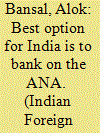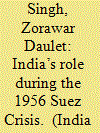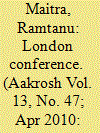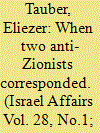| Srl | Item |
| 1 |
ID:
124882


|
|
|
|
|
| Publication |
2013.
|
| Summary/Abstract |
Many analysts perceive that India should evolve a joint strategy with the Central Asian States to counter both the Taliban and Pakistani influence in Kabul. However, this has the grave disadvantage of being perceived as anti-Pakhtoon in Afghanistan's fractured ethnic mosaic. Similarly, any coalition with Iran is likely to be perceived as anti-Sunni by the dominant sect in Afghanistan. In addition, considering the current state of US-Iran relations, any relationship with Iran has a risk of running afoul of the USA. The best option for India is to bank on the ANA and pro-India politicians in Afghanistan. India must not allow it to be side-lined on Afghanistan as was done in the Turkey and London Conferences. There are many Afghan politicians who are willing to do India's bidding.
|
|
|
|
|
|
|
|
|
|
|
|
|
|
|
|
| 2 |
ID:
163316


|
|
|
|
|
| Summary/Abstract |
The 1956 Suez conflict was not inevitable. The involvement of an impartial third party had offered an exit ramp for the main protagonists. Largely forgotten today, India strove to reconcile the interests of the Westerns powers with Arab nationalism. Displaying creativity and perseverance in attempting to arrest the sudden deterioration in security in its extended neighborhood, India’s unceasing but responsible support for a weaker Arab state in the backdrop of determined Western coercion is a useful illustration for contemporary policymakers who are attempting to craft a sustainable approach towards a tumultuous West Asia. Using previously unused archival documents, this paper adds to the small literature on India’s involvement in this crisis by offering the first detailed account of India’s attempt to prevent the outbreak of hostilities in those fateful months of 1956. By doing so, this article also reveals interesting facets of India’s approach to conflict management and regional stability in the 1950s, a role that was predicated on not just promoting strategic restraint between antagonistic states but also enabling conflict resolution options that preserved the vital interests of competing actors.
|
|
|
|
|
|
|
|
|
|
|
|
|
|
|
|
| 3 |
ID:
095076


|
|
|
| 4 |
ID:
183988


|
|
|
|
|
| Summary/Abstract |
The article follows a correspondence between two anti-Zionist activists, George Antonius, author of The Arab Awakening and a member of the Palestinian Arab delegation to the 1939 London ‘round table’ conference, and Elizabeth P. MacCallum, a Canadian expert on the Middle East and later the ‘Middle East desk’ of the Canadian Department of External Affairs. Following a very negative book review of The Arab Awakening by the American journalist Albert Viton, MacCallum tried hard to publish positive reviews of the book. She failed, as she failed several years later in her attempts to thwart Canadian support for the UN Palestine partition resolution.
|
|
|
|
|
|
|
|
|
|
|
|
|
|
|
|